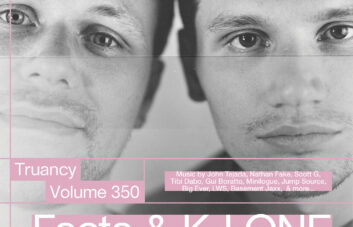Sasu Ripatti is, by definition, a veteran of electronic music. His work as Luomo saw him lauded at the turn of the century with the seminal vocal house LP Vocalcity. He has also ventured into minimal techno as Sistol, but it’s as Vladislav Delay where the majority of his work lies. It’s also arguably his most captivating work. The fantastic Multila would pave the way for much of Ripatti’s later work, mostly glitchy ambient techno which perhaps peaked at 2007’s Whistleblower. VISA, however, takes a step back from the glitchiness and the beats that defined his earlier works and takes Vladislav Delay to the most decidedly ambient it’s been as a project for a very long time.
We’re told that VISA was created by Ripatti after he was denied entry to the United States for a tour. He took the opportunity of having a few weeks free to create new music and VISA was the product. The album is came about as a result of his excess creative energies following the tour cancellation, “a valve broke open… and I collected what came out the pipes” is how Ripatti described the process of creating the record. VISA is undeniably full of interesting ideas and creates textured soundscapes and head spaces that feel stuck somewhere between a forest in winter and a dream-like mechanical afterlife. In other words, it achieves in creating sounds that feel as organic as they do artificial and this contrast makes it a mesmeric record.
Clocking in at nearly 23 minutes, the album opener “Visatron” is an indicator of the mindset that Ripatti was in when the album was created. It’s melancholic, droning, looping, at times discordant and at times not, but it is without a doubt engaging for the duration. It’s comprised mainly of a number of different loops that are blended into each other, somewhat akin to Ripatti and others’ live sets. With the narrative behind the album, that he’d been deprived of performing his live sets for a few weeks, its understandable that he’d construct something that isn’t too dissimilar from one. That continuity is present in the whole album, it flows and transitions almost seamlessly as we’re taken into “Viaton”. It’s full of contrasts as the track starts as muted and organic and builds into mechanical, glitchy drone before ebbing back to calm.
“Viisari” feels like the most urgent track on the record. Here you really get the sense of Ripatti trying to capture his brimming ideas which bounce and click with sublime exigency. That Ripatti “collected what came out the pipes” to create the album is none more evident here. But while that might suggest that Viisari is simply ideas thrown together, it is instead rather cohesive. “Vihollinen” (and indeed the whole record) has shades of Tim Hecker’s Radio Amor with its thunderous drones punctuated with static, ominous repetitive piano chord and indistinguishable vocalisations which could well have been lifted from radio airwaves. The tail end of the ten minute track descends into distorted gunshot-like stabs creating an atmosphere in the track that is in equal parts unsettling as it is beautiful. It isn’t surprising that the track title translates from Finnish as “The Enemy”, showing Ripatti’s aggravation with the situation. Ultimately the piece stands out in the album as feeling the most personal and emotional, a quality that has often distinguished Ripatti’s music from his peers (“Tessio” from Vocalcity being a masterclass in how to make house music dripping with emotion). The final track “Viimeinen” (figuratively ‘The Last’ in Finnish) is the shortest and most understated on the album. It’s lush, light and looping and bring the record to a satisfyingly calm conclusion. It doesn’t feel dragged out and that can be said for VISA as a whole. None of the tracks feel superfluous at any point, nor do they overstay their welcome.
It’s not very often that an artist as established as Ripatti delivers one of their finest works to date, seemingly out of nowhere, but he’s done exactly that with VISA. Ambient music can at times feel like it veers too far into the abstract which for some can be off-putting, feeling too detached from reality to create any emotional connection with the listener. The record being borne of frustration means that VISA feels like an inherently personal record. It eschews this emotional detachment that can plague ambient records that may theoretically be solid but ultimately lack that certain something. Ripatti has the uncanny ability to make 10 minutes feel like half that, creating intricacies and details that may be missed first time round but are what keeps the listener captivated. Ambient has enjoyed a stellar year so far with the likes of Kyle Bobby Dunn, M. Geddes Gengras, Graham Lambkin & Jason Lescalleet all providing ample listening as the nights begin to draw in, but it’s Vladislav Delay who has provided what could well end up being the finest ambient record of the year. He is undoubtedly back to his very best and we couldn’t be happier about it.




